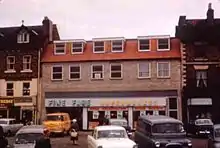Fine Fare
Fine Fare was a chain of supermarkets in the United Kingdom. Their Yellow Pack budget own-label range, introduced in 1980, were the first own brand basic ranges to be introduced in the UK.

 | |
| Type | Private company, subsidiary |
|---|---|
| Industry | Retail |
| Fate | Sold and rebranded to Gateway |
| Successor | The Dee Corporation |
| Founded | 1951 |
| Defunct | 1988 |
| Headquarters | Welwyn Garden City, United Kingdom |
Key people | James Gulliver, (chairman 1967–1972) |
| Parent | Howardsgate Holdings (1951–1963)
Associated British Foods (1963–1986) Dee Corporation (1986–1988) |
| Subsidiaries | Melias, Shoppers Paradise |
History
The company began as one single supermarket in Welwyn Garden City in 1951, as an offshoot of the Welwyn Department Store,[1] owned by Howardsgate Holdings, the company of Ebenezer Howard, the founder of the garden city movement.[2] It was one of a series of convenience store chains established in the 1950s, the others being Premier and Victor Value.[3]
In January 1959, it won a court case against Brighton Corporation, which had insisted that its outlets closed on Wednesday afternoons under the Shops Act 1950.[4] By 1962, it had over two hundred shops.[5]
The company was acquired by Associated British Foods in 1963.[6] ABF appointed James Gulliver to the post of chairman of Fine Fare in 1967; he continued to lead the business until 1972.[7] Seven years after the takeover by Associated British Foods, the turnover had grown from £75 million to £200 million.[8]
In 1974, Fine Fare bought the East Anglian based Downsway supermarket chain, which was owned by the Vestey family business, Union International Group. This added a further eighty stores to the group. Other chains purchased included Burton Supermarkets (Nottingham based), Elmos (East Anglian based) and Coopers (Scotland based in 1955).[9]
The business was regularly listed as third in market share behind Sainsbury's and Tesco, and had stores nationwide. They also owned the Melias,[10] and Shoppers Paradise chains of convenience and discount food stores,[11] and moved into the burgeoning DIY industry with their Fix and Fit stores (sold to WHSmith Do It All in 1986).[12] In 1983, Fine Fare became Britain's first supermarket to sell organic foods.[13]
In June 1986, ABF sold the company to The Dee Corporation (subsequently known as Somerfield).[14] Following this, all Dee Corporation's newly acquired stores were rebranded as Gateway or closed, and the Fine Fare name had disappeared by the end of the 1980s.
Fine Fare sponsored the Scottish Football League for three years from the season of 1985–86 (beginning August 1985)[15] to the season of 1987–88 (which ended in May 1988, around the same time that the last Fine Fare stores closed).[16] The business also advertised on television, the commercials were fronted by the actor Gordon Jackson for a time.[17]
Operations
Fine Fare's depots were at Welwyn Garden City (Hertfordshire), East Kilbride (Lanarkshire), Washington (Tyne & Wear), Cheadle Hulme (Stockport), Hucknall (Nottingham), Tuffley (Gloucester) and Aylesford (Kent). Shoppers Paradise only depots were at East Kilbride (Lanarkshire), Weedon (Northampton), Stevenage (Hertfordshire) and Alton (Hampshire). Washington also held stocks of non food items for national distribution.
In popular culture
Fine Fare is mentioned in the song "Aisle of Plenty" from the album Selling England by the Pound by the progressive rock band, Genesis.[18] It was also the subject of a song by the punk band Toy Dolls called "Nowt Can Compare to Sunderland Fine Fare" from their fourth album Bare Faced Cheek.[19]
- "Welwyn Garden City:Welwyn Gardens own Supermarket Chain". Our Welwyn Garden City. Retrieved 16 April 2015.
- "Obituary: Bryan Russel Archer – Architects Journal". Retrieved 17 April 2015.
- Hamlett, Jane; Regulating UK supermarkets: an oral-history perspective By Jane Hamlett, Andrew Alexander, Adrian R. Bailey and Gareth Shaw, published by Historyandpolicy.org, accessdate: 18 February 2011
- "Royal Court of Justice", The Times page 4, 29 January 1959
- Stratton, Michael; Trinder, Barrie Stuart (2000). Twentieth century industrial archaeology By Michael Stratton, Barrie Stuart Trinder Page 82. ISBN 9780419246800. Retrieved 18 February 2011.
- Associated British Foods: History Archived 24 April 2009 at the Wayback Machine
- James Gulliver Chairman of Food Group dies at 66 The New York Times, 17 September 1996
- "Obitury of Sir Alistair Grant – The Independent p.24 Jan 2001" (PDF). Retrieved 16 April 2015.
- "Ms Dow antiques". Retrieved 16 April 2015.
- United Kingdom. "Louis Sherwood". Merchantventurers.com. Archived from the original on 17 June 2011. Retrieved 18 February 2011.
- "Strategy in Retailing: the development of Kwik Save Group plc" (PDF). Irs.stir.ac.uk. Retrieved 18 February 2011.
- "The Lost Precinct: An A to Z of Defunct Retailers – EM60 East of the M60". Retrieved 16 April 2015.
- The Death of Rural England: A Social History of the Countryside Since 1900 by Alun Howkins – ISBN 9780415138840
- Somerfield: History Archived 18 December 2008 at the Wayback Machine
- "Celtic Match Programmes 1985". Celticmatchprogrammes.co.uk. Retrieved 18 February 2011.
- "Celtic Match Programmes 1987". Celticmatchprogrammes.co.uk. Retrieved 18 February 2011.
- "Gordon Jackson in Pictures". Retrieved 17 April 2015.
- "Aisle of Plenty lyrics". Retrieved 15 March 2014.
- "The Toy Dolls Lyrics – lyricsbox". Retrieved 17 April 2015.